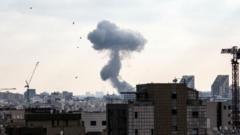As Israel grapples with the fallout of U.S. airstrikes on Iran, citizens express divided opinions on the impacts and future of regional security in a tumultuous atmosphere.
Tensions Rise in Israel Following U.S. Strikes on Iran

Tensions Rise in Israel Following U.S. Strikes on Iran
A mix of hope and anxiety permeates the Israeli public after military actions by the U.S. against Iranian nuclear sites.
Israelis were met with a new reality on June 22, 2025, after the United States military executed significant pre-dawn strikes on three critical Iranian nuclear facilities, marking its involvement in the ongoing conflict. The public reaction varied widely; some felt a wave of optimism, envisioning an era where the threat of a nuclear-capable Iran is diminished. Others, however, expressed fears that the U.S. actions could provoke a more intense Iranian response, potentially escalating into a longer and more destructive conflict.
Support for President Trump and Prime Minister Benjamin Netanyahu highlighted the schisms in public sentiment. While some celebrated the military intervention as a decisive and historic moment for Israeli security, others shared concerns about the ramifications of such escalation, with families and communities being forced into bomb shelters as Iran retaliated with missile strikes.
In the wake of the strikes, opposition leader Yair Lapid recognized the gravity of the situation, deeming the events as historic and expressing gratitude towards the U.S. efforts. On social media, he insisted that both Israel and the Middle East were now positioned towards greater safety, reflecting a communal yearning for stability amidst the chaos that followed. As the Israeli Air Force continued its operations targeting Iranian assets, the nation remained in a state of heightened alert, hoping that strife could soon give way to an era of peace.























